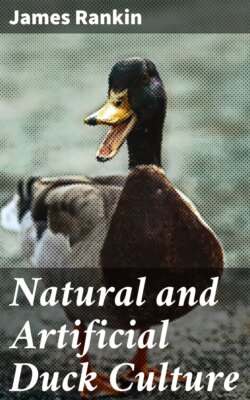Читать книгу Natural and Artificial Duck Culture - James Rankin - Страница 11
На сайте Литреса книга снята с продажи.
Advantages with Ducks.
ОглавлениеTable of Contents
The same rule holds good in a measure with breeding ducks, though not in so great a degree. For instance, your hen when closely confined seems to lose her ambition, and spends a large part of her time on the perches, apparently indifferent to all sublunary things. Not so your duck. She is in constant motion, no matter how small her quarters. No meditation for her. Indeed, the days seem too short for her to exercise in, and so she keeps it up through a great part of the night. Her greatest ambition seems to be to distribute the few quarts of water you have given her for drink, evenly all over the pen you have just covered with dry, finely-chopped straw, and make it as sloppy as possible, and it is astonishing in how short a space of time she will succeed in doing it. Again, snow and ice are the aversion of the hen.
She cannot be induced to step in either except under pressure of circumstances. Not so your duck. She likes nothing better than to be out in a snow bank during a thaw, and if she can only work it up into the color and consistency of mud it suits her exactly. She does not mind the cold if she can only keep her feet warm. She is clothed with an impenetrable coat of feathers and an equally thick coat of down. She does not take kindly to confinement in a building and will utter her constant protest, and like the average school boy of ten prefers to suffer from the cold outside to being comfortable in. Therefore, the main point in breeding early ducks and erecting buildings for the same, next to supplying them with the right kind of food, is to keep their feet warm. Cold feet affect the winter laying of the duck the same as a frozen comb affects the hen. It stops the egg production at once.
